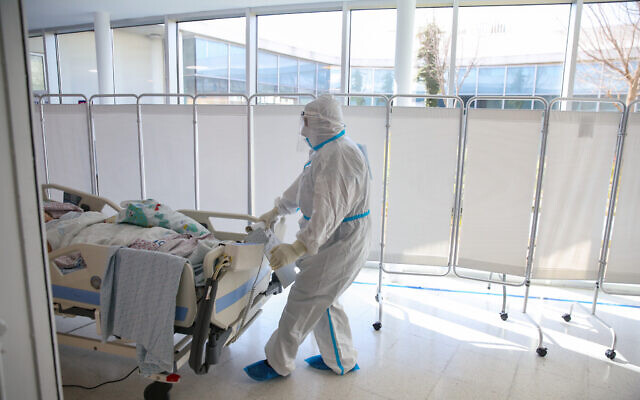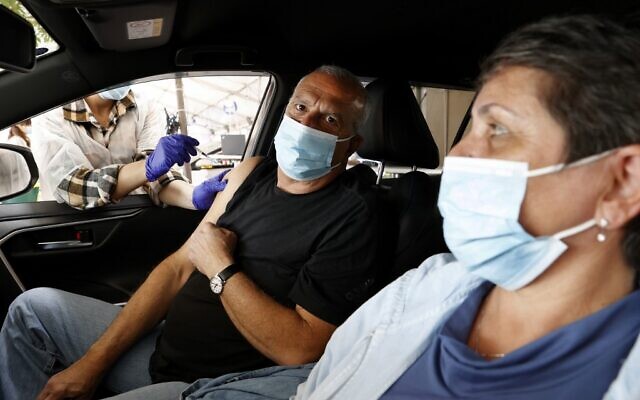Initial data from Israel’s vaccination campaign shows that Pfizer’s coronavirus vaccine curbs infections by some 50 percent 14 days after the first of two shots is administered, a top Health Ministry official said Tuesday, as the country’s serious COVID-19 cases, daily infections and total active cases all reach all-time peaks.
Sharon Alroy-Preis, head of the Health Ministry’s public health department, told Channel 12 News that the data was preliminary, and based on the results of coronavirus tests among both those who’ve received the vaccine and those who haven’t.
Other, somewhat contrary data was released by Israeli health maintenance organisations Tuesday evening. Channel 13 News said that according to figures released by Clalit, Israel’s largest health provider, the chance of a person being infected with the coronavirus dropped by 33% 14 days after they were vaccinated. Separate figures recorded by the Maccabi health provider and aired by Channel 12 showed the vaccine caused a 60% drop in the chances for infection 14 days after taking the first shot.
Each of the HMOs compiled the data from some 400,000 patients they treated (800,000 in total).
The cause for the discrepancy between the studies was not immediately clear.
With Pfizer’s phase 3 trials only checking some 40,000 people, and given Israel’s world-leading vaccination campaign, the data could be some of the best on-the-ground indication yet of the vaccine’s efficacy.

Dr. Sharon Alroy-Preis. (Courtesy)
Regardless, the vaccine is only expected to reach full protection potential a week after the administration of the second dose of the vaccine, which began in Israel this week. The second dose is expected to bring immunity levels to some 95% after about a week.
Alroy-Preis stressed that the data wasn’t enough to conclude that the vaccine prevents transmission of the virus altogether, since it is believed that one can spread the virus to others for a limited amount of time if it is located in their nasal cavity, even if it hasn’t infected the body to a level that would yield a positive test result.
Earlier, Alroy-Preis said that nearly one-fifth of over 1,000 current serious COVID-19 patients had previously received the first dose of Pfizer’s vaccine — stressing the need to continue to protect oneself after receiving the shot.
“Seventeen percent of the new serious cases today, or 180 cases, are after the first dose,” she told reporters.

Hospital staff transport a new patient to the coronavirus ward of Ziv Medical Centre in the northern Israeli city of Safed, January 7, 2020. (David Cohen/Flash90)
Alroy-Preis also expressed alarm at the sky-high infection rates throughout the country, which have climbed to nearly 10,000 new daily cases.
“We have never had such a figure,” she said, adding that the more infectious British strain of the virus, which is believed to have spread throughout the country, has surely played a part in the steep rise in serious cases.
She said Israel will likely have to extend its nationwide lockdown, but added that there were initial signs that the rise in infection rates was starting to slow down.
Alroy-Preis said that 73% of Israelis who are over the age of 60 or who have other high-risk factors have already been vaccinated with at least one shot, but noted that inoculations were slower in the Arab and ultra-Orthodox communities.
The latest number given by officials for total vaccinations was 1,910,330 — about 20% of the population — although Prime Minister Benjamin Netanyahu on Tuesday held a ceremonial event celebrating the 2,000,000th vaccinee.
Health Ministry sources and experts have in recent days been cited by various news outlets in reporting that the exit from Israel’s latest strict lockdown, imposed Friday, will likely take time, be gradual and depend on the vaccination rate and the trend seen in serious COVID-19 cases.
The current closure — set to expire January 21 — is almost sure to be extended, the sources have said.

People walk on Jaffa Street in downtown Jerusalem on January 8, 2021, during a 3rd nationwide full lockdown, in an effort to prevent the spread of COVID-19. (Yonatan Sindel/Flash90)
Updated figures published Tuesday evening by the Health Ministry said 9,665 new cases had been confirmed Monday, an all-time record. However, the rate of positive tests, 7.6%, was roughly half of the record reached in September. The number of daily tests has since grown dramatically and stood at 127,075 on Monday.
Initial figures for Tuesday showed a similar positivity rate of 7.3% — 5,399 cases out of 73,874 tests conducted by 6 p.m.
The number of total cases since the pandemic began, which passed half a million earlier in the day, reached 508,604, including 75,408 active cases — a new all-time record. Of them, 1,072 people were in serious condition, including 336 listed as being in critical condition and 269 on ventilators.
The death toll surged to 3,756 — an increase of more than 50 since the morning.
The Health Ministry hopes to have vaccinated 5.2 million citizens against the coronavirus by the end of March.

An Israeli receives his second Pfizer COVID-19 vaccine at the Maccabi Health Services drive-in vaccination center, in the northern coastal city of Haifa, on January 11, 2021. (JACK GUEZ / AFP)
Health officials told Channel 12 Monday that based on the recent agreement reached with the Pfizer pharmaceutical company, each week will see shipments of hundreds of thousands of vaccine doses land in Israel.
It will allow an additional 1,300,000 Israelis to receive their first dose, and 1,800,000 to receive their second dose, this month. The Health Ministry plan will see those as young as 40 beginning to be vaccinated in February, with 1,450,000 people receiving their first dose and 1,750,000 receiving their second dose in that month. In March, the remaining population above the age of 16 will be allowed to receive their first shots, with 1,700,000 slated to receive the second dose.
If Pfizer meets all of its benchmarks in vaccine shipments, 5.2 million Israelis will be vaccinated by March 20, according to the Health Ministry plan. That date also happens to be three days before the election. Prime Minister Benjamin Netanyahu, who is on trial for corruption charges, has made the country’s vaccine drive the focal point of his reelection campaign.
The Health Ministry is also planning to introduce vaccination certificates as the county readies to reopen the economy, which will allow those vaccinated (as well as those with up-to-date negative COVID-19 tests) to attend various events and partake in activities from which others will be blocked.
Read original article HERE.
 RSS Feed
RSS Feed















 January 13th, 2021
January 13th, 2021  Awake Goy
Awake Goy  Posted in
Posted in  Tags:
Tags: 













